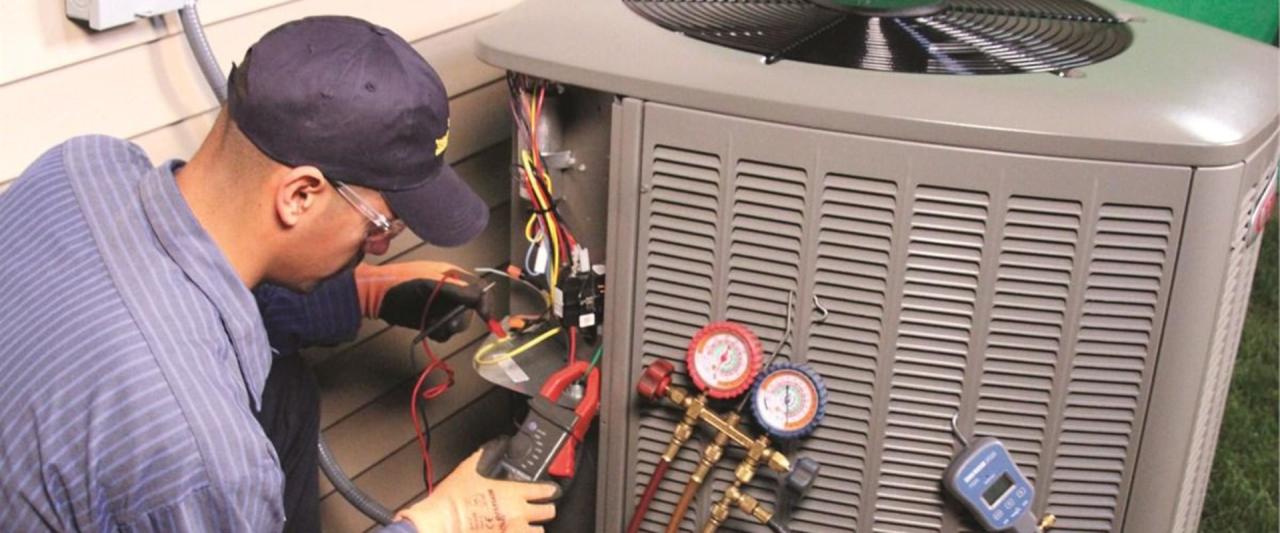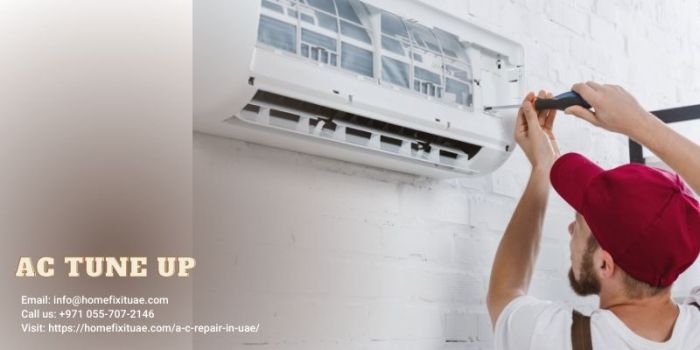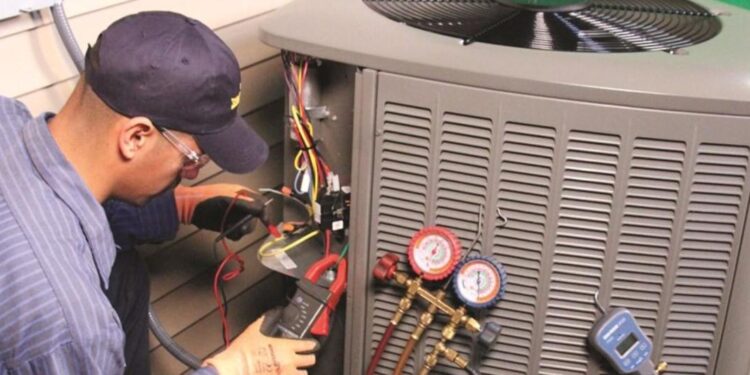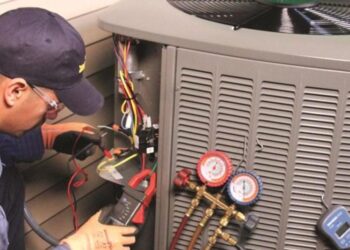When Is the Best Time for an Air Conditioner Tune-Up? sets the stage for understanding the importance of regular maintenance, frequency considerations, and DIY tips to keep your air conditioner running smoothly. Let's delve into these key aspects to ensure your cooling system remains efficient and cost-effective.
The following sections will guide you through the optimal timing for tune-ups, shedding light on when to schedule maintenance for maximum benefits.
Importance of Air Conditioner Tune-Up

Regular air conditioner tune-ups are crucial for ensuring the optimal performance and longevity of your cooling system. By scheduling routine maintenance, you can prevent potential breakdowns, improve energy efficiency, and ultimately save money in the long run.
Improving Efficiency
Performing a tune-up on your air conditioner involves cleaning or replacing filters, checking and adjusting refrigerant levels, inspecting and lubricating moving parts, and ensuring all components are in proper working condition. These tasks help your air conditioner operate more efficiently, allowing it to cool your home effectively while using less energy.
- Regular tune-ups can improve airflow, reducing strain on the system and promoting better circulation of cool air throughout your home.
- Proper maintenance can also help identify and address minor issues before they escalate into costly repairs, extending the lifespan of your air conditioner.
- Well-maintained air conditioners consume less energy, leading to lower utility bills and overall cost savings over time.
Frequency of Tune-Ups

Regular tune-ups are essential to ensure the optimal performance and longevity of your air conditioner. The frequency of tune-ups can vary depending on certain factors.
Recommended Frequency
It is generally recommended to schedule an annual air conditioner tune-up. This helps in detecting any potential issues early on and ensures that your AC unit operates efficiently throughout the year.
Factors Influencing Frequency
- The age of your air conditioner: Older units may require more frequent tune-ups to maintain their performance.
- Usage patterns: If you use your air conditioner more frequently or in extreme weather conditions, more frequent tune-ups may be necessary.
- Environmental factors: Dust, pollen, and other debris can accumulate in the system, requiring more frequent maintenance.
Benefits of Annual Tune-Ups
Regular annual tune-ups offer several benefits:
- Improved efficiency: A well-maintained air conditioner operates more efficiently, reducing energy costs.
- Preventive maintenance: Early detection of issues can prevent costly repairs down the line.
- Extended lifespan: Regular tune-ups can help prolong the life of your air conditioner.
Best Time for Tune-Up
When it comes to scheduling an air conditioner tune-up, choosing the right time of year can make a significant difference in the performance and longevity of your cooling system. Seasonal changes impact how efficiently your air conditioner operates, making certain times of the year more suitable for maintenance.
Optimal Season for Tune-Up
One of the best times to schedule an air conditioner tune-up is in the spring, before the peak cooling season begins. During this time, HVAC professionals are less busy, allowing for more flexible scheduling and quicker service. It also ensures that your air conditioner is in top condition before it starts working hard to keep your home cool during the summer months.
Another good time for a tune-up is in the fall, after the cooling season has ended. This allows for any issues that may have arisen during the summer to be addressed before the unit is shut down for the winter.
It also ensures that your air conditioner is properly maintained and ready to go when the next cooling season rolls around.
DIY Maintenance Tips
Regular maintenance is key to keeping your air conditioner running efficiently. While some tasks are best left to professionals, there are simple maintenance tasks homeowners can perform on their air conditioners to help extend its lifespan and improve its performance.
One of the most important DIY tasks is cleaning or replacing air filters regularly. This not only helps maintain good air quality but also ensures proper airflow and cooling efficiency. Here is a step-by-step guide for cleaning or replacing air filters, along with some safety precautions to consider when performing DIY maintenance
Cleaning or Replacing Air Filters
- Turn off the power: Before starting any maintenance, make sure to turn off the power to your air conditioner to avoid any accidents.
- Locate the air filter: The air filter is usually located near the return air duct. Remove the cover or panel to access the filter.
- Inspect the filter: Check the condition of the filter. If it is dirty or clogged, it needs to be cleaned or replaced.
- Clean the filter: If the filter is reusable, gently clean it with a vacuum or wash it with mild soap and water. Make sure it is completely dry before reinstalling.
- Replace the filter: If the filter is disposable, replace it with a new one of the same size and type. Make sure it is installed correctly.
- Reassemble and turn on the power: Once the filter is cleaned or replaced, reassemble the cover or panel and turn the power back on.
Remember to check your air filters every 1-3 months and clean or replace them as needed to ensure optimal performance.
Safety Precautions for DIY Maintenance
- Always turn off the power before starting any maintenance tasks on your air conditioner.
- Wear protective gear such as gloves and goggles to prevent injury while handling sharp or dirty components.
- Follow manufacturer's instructions carefully when cleaning or replacing air filters to avoid damaging the unit.
- If you are unsure about any maintenance task, it is best to consult a professional HVAC technician to avoid causing any damage to your air conditioner.
Professional Tune-Up Services
When it comes to professional air conditioner tune-up services, there are key components that technicians typically address to ensure the optimal performance of your unit. Hiring a licensed technician for maintenance comes with several benefits, including expertise, precision, and the guarantee of a job well done.
Let's delve into the common procedures involved in a professional tune-up.
Key Components of a Professional Tune-Up
- Checking and replacing air filters
- Inspecting and cleaning evaporator and condenser coils
- Examining refrigerant levels and recharging if necessary
- Tightening electrical connections
- Lubricating moving parts
- Calibrating thermostat settings
Benefits of Hiring a Licensed Technician
- Expertise in handling complex AC systems
- Precision in diagnosing and fixing issues
- Ensuring safety and compliance with regulations
- Preventing major breakdowns and costly repairs
Common Procedures in a Professional Tune-Up
- Inspecting the overall condition of the unit
- Cleaning the unit inside and out
- Checking for leaks in the ductwork
- Testing the system's efficiency and performance
- Providing recommendations for improvements or repairs
Closure
In conclusion, knowing When Is the Best Time for an Air Conditioner Tune-Up? can make a significant difference in the performance and longevity of your air conditioning unit. By staying proactive and informed, you can enjoy a cool and comfortable indoor environment throughout the year.
FAQ Overview
When should I schedule an air conditioner tune-up?
You should schedule a tune-up in the spring before the cooling season begins to ensure optimal performance.
How often should I get my air conditioner tuned up?
It's recommended to get a tune-up once a year to keep your AC running efficiently.
Can I perform DIY maintenance on my air conditioner?
Yes, there are simple tasks like cleaning or replacing air filters that homeowners can do themselves to maintain their unit.
What are the benefits of hiring a professional for a tune-up?
Professionals can ensure thorough maintenance, identify potential issues, and extend the lifespan of your air conditioner.









![How To Avoid Contractor Scams [Infographic]](https://ac.radartasik.id/wp-content/uploads/2025/10/how-to-avoid-contractor-scams-feat-120x86.png)

